- Home
- Mary Anne Kelly
Keeper of the Mill Page 2
Keeper of the Mill Read online
Page 2
She watched her house come into view with the same mixture of astonished pride and shame she’d feel running into her son when he was filthy and in dire need of a haircut. There was an awful lot of rusty tricycles, bedraggled doll’s houses, and balls and bats scattered across the driveway. She’d have to get them to clear the place. Promise them an excursion to Bishop’s Comic Book and Baseball Card Store to juice them up. First impressions were so important, and no one was more fastidiously clean than Isolde. Hadn’t she taught Claire to scrub the bathroom tile behind the faucet with a recycled toothbrush and bleaching powder? Stood behind her, hands on her hips, until she’d got it right? Who’d been coming to visit, Claire’s own boyfriend? Claire jumped off the bike and took the steep hill by foot. “San Francisco in your own front yard,” Johnny liked to say. The phone was ringing as she came in the back door, and she covered the kitchen floor in two long strides to get to it.
“Claire? Oh, good. I wasn’t sure what time it was there.”
“Isolde? My God. What time is it? Have you landed already?”
“Darling, I never took off.”
“Wait, what? You’re still at Munich Airport?” This wasn’t bad. Now she’d have another whole afternoon to snazz up the basement, not just ram things into clandestine piles in overloaded cupboards.
“No, you don’t understand. I’m home. I’m still home! I’m not coming after all.”
“What?”
“Oh, Claire, don’t sound like that. Your voice so forlorn.”
“What do you mean, you’re not coming? I bought new sheets and curtains for the guest room. You’ve got to come!”
Isolde’s husky, whisky voice laughed long and hard. Then, “Claire,” she whispered, becoming intimate, “I can’t come down because so much has happened, and—I hope you’re sitting down—I’m getting married.”
“Married?”
“Tch. You don’t have to sound so astonished. Yes, married.”
“What? But how—”
“I know”—Isolde yawned across the broad Atlantic—“it’s all still new to me, too.”
“When, today?”
“Of course not today. He only just asked me. May seventeenth.”
Claire looked frantically around her bright, cold kitchen. The door, unlatched, swung open in the wind. “Who? Who asked you? Wolfgang?”
“Wolfgang? Don’t be silly. Who would want to marry Wolfgang? It’s Blacky. I’m marrying your old kumquat, Blacky.”
“What!”
“Oh, please stop shouting ‘What’ like that.”
“You can’t,” Claire whispered.
“I bloody well can.”
“Isolde, have you gone absolutely mad?”
“Yes, I suppose I have.”
“What will become of you?”
They both said nothing, mulling together what would indeed become of her. Both saw, as if by magic, the same evening sunlit picture of an Isolde older still, sitting on an orange-and-white chair beneath a chestnut tree in a busy beer garden, holding her head of great dark hair in her hands, bemoaning her absurd, romantic destiny.
“Well, anyway,” Isolde said finally, “I’ll have my crow’s feet done for nothing from now on.”
Blacky, Doktor von Osterwald, was the busiest plastic surgeon in Munich. And this was a rather pointless, silly thing for Isolde to say because she had never paid Blacky once, and he’d had a hand in that stunning face many times already. For years. Even when he and Claire had been together. Claire remembered: Blacky had always been bringing them together. Claire had never worried because Isolde had been a good—what was it?—six or seven years older than she, automatically eliminating her from what Claire considered the “running.” Now, of course, Claire was older than Isolde had been then. And that put a different slant on things. Claire knew now, for instance, that eye contact, more than any dewy youthfulness, had to do with sexual attraction, and she wondered what the two of them had been up to years ago, while she’d been off on an unsuspecting shoot in Vientiane or Villengilly.
“I don’t suppose you love him,” Claire heard herself say.
“Love?” Isolde snorted derisively, characteristically. “Certainly not.”
So Claire knew, then, all at once, that Isolde not only loved him but was hopelessly, crazily in love with him. “That’s all right then.” She tried to sound chummy. It wouldn’t do to let Isolde know she knew. Poor thing. “I can’t believe you’re not coming, though,” she said, meaning it, suddenly seeing the days and the weeks before her free. Nothing in front of her but seeing the children off in the morning and doing the marketing and being there for them when they came back. And laundry, lots of laundry. Johnny coming and going. No real Johnny to look at and talk to, really talk with. Those days were over, she sighed, unhappy at last, wishing that Isolde still were coming and she could show off her brilliant sense of color and Gemütlichkeit, coziness, for hadn’t she learned all that from Isolde? Hadn’t it been Isolde’s sneer in her ear she’d used in deciding whether or not to buy this or choose that? Yes, she admitted now, for she had no reason not to, it had.
“Of course you’ll come,” Isolde said.
Claire laughed. “I wish.”
“What, of course you must. You’ll stand up for me.”
Claire started to whimper. No tears would come. They never did anymore. Her face crunched into a grimace of misery and a catlike sound eked out.
“What’s that? What are you doing, blubbering?”
“I’m not, it’s just—so happy for you, Isolde. For you both.”
“Sure you are. Tell me, has that moron you married figured out how to steal some money yet? Oh, please, don’t answer, don’t defend him. I can’t bear it.”
“Isolde, please. Don’t.”
“All right. But only because I know you’ll hang up on me if I go on, and I don’t feel like redialing that dreadful, boring number. So what can I do? Send you the ticket? I will, you know.” And for a moment Claire feared there was nobody else, no one to stand up for Isolde in her moment of—whatever it was she was going to accomplish—but how silly. Isolde, Munich’s own party girl extraordinaire. Even if she went they’d hardly see her for the throng.
“I know you would, Isolde. I couldn’t, though. You know that.”
“Ach. Scheisse! The doorbell! I’ve got to go. It’s that fool Wolfgang. I’ll call back tomorrow.” She hung up the phone. The mournful, empty ring of a gone connection sang from Claire’s still trembling hand.
“What’s the matter, Mommy?” Anthony stood in the doorway, pajamaed and rubbing one eye with a fist. “Is it the dryer broken again?”
And outside the house, where Claire had been so sure that spring was on its gentle way, great white flakes came down in a hurry, the way they will do when they cover the house and intend, absolutely, to stay.
Breakfast started off well, pancakes and bacon and nectarines, the cozy excitement of a good fast snowstorm, not fast enough to shut down school, though, and Claire was left with a muddy, sticky floor and a pile of dishes in the sink. She sat, legs crossed, rocking one foot up and down while she finished reading the News. Floozie the dog kept her company. Something lovely was on the radio. Brahms, she supposed. She pushed the paper away and frowned, grappling with an ornery cuticle. She didn’t know how she had supposed she could have provided a charming household for Isolde. Just look at this place. She sighed, the dog sighed, and she got up and put her warm pea coat on and her worn, but still very nice, navy-blue beret. The door banged shut and left the house the way it was in there, quiet and full of things and on its own. Her bike was in the yard. Luckily she’d propped it against the house, underneath the porch awning, and it was still dry. Floozie, never one to stay home once she was up, deposited a steaming yellow piddle in the snow and hopped up onto the scarf in the handlebar basket and they were off.
It was good packing snow, not slippery, and they tooled along, philosophically accepting their pelting of teeny doilies in the mouth, in
the eyes, looking up at the tops of the heavy trees and watching as, little by little, the closed knots of buds were obliterated with white. A remarkable morning. And, yes, better that Isolde hadn’t come. Claire pedaled down to Jamaica Avenue, but the five-and-ten wasn’t open yet. She pedaled back; it was slower going this time. She decided to make a nice visit to church, noticed there was a Mass going on and so thought better of it. She hated to think how that early-morning crew would make shocked faces at her bicycle. She didn’t know why. God wouldn’t mind her bicycle at all, but never mind, she wouldn’t go, she would do a good deed and stop in at Iris’s. Cheer her up. She wheeled her bike brazenly into Iris’s garage, transported Floozie up the steps, and wound the bell. There was a little forest of potted plants on the porch, looking very dear and Swiss and chilly. When Iris didn’t come, Claire rattled the door finally and there she was, aggravated from the look of her and—Claire took a quick step backward—drunk from the blue, ginny reek of her. “Jesus,” Claire said.
“Well, come in anyway,” Iris said.
“No, I’m sorry I disturbed you, I—Iris! What the hell are you doing? Drinking at ten o’clock in the morning?”
Iris looked her up and down with a frayed, sad sneer, then turned her back and swayed unsteadily across the room. It was filled to the brim with antique tables and chairs and worn Turkey carpets and blown ruby glass and paintings in golden frames. There was the substantial coat of dust old people’s houses have. Iris lowered herself to the edge of a tapestry wing chair and then fell, phlump, back against the cushions. She laughed.
“Whoa there, Nellie.” Claire tried the seat across from her.
“I’m not so drunk,” Iris complained. “I was for an hour or so, but now”—her eyes slid shut—“I’m just ready for a nap.”
Claire watched her for a moment, reached across and patted her hand, then stood to go.
“You don’t have to leave just yet,” Iris murmured.
“Well, then I won’t.” Claire sat back down. She pulled a well-worn bisque baby doll from underneath her butt and got comfortable. “There’s no one waiting for me at home till three o’clock anyway,” she admitted. “And”—she shrugged—“Isolde won’t be coming after all.”
Iris’s eyes clicked open. “What’s that?”
“Yeah, and you won’t believe why. She’s getting”—she cleared her throat—“married.”
“Married?”
“Yes. And do you know who it is she’s marrying? My old boyfriend, that’s who. The doctor.” As this didn’t seem to impress Iris too much, she added, “The one with all the money.”
“Ah.”
“I mean, they invited me to come. Well, she did. Isolde wants me to be her matron of honor. Of course I said no.”
“Of course.”
“I couldn’t leave my family.”
“Of course not.”
“I’m so glad to be back in America anyway. Who wants to go there again, for God’s sake?”
“Not me, that’s for sure. You wouldn’t get me back to Munich,” Iris agreed, shivering. “Not for five million bucks.”
“Ha. Five million bucks, I’d go.”
“Not me.” Iris shook her fragile head vehemently. She reached over to the nearby keys of the baby grand but flinched at the awful stiffness of her fingers. “Not again, not ever. And I’ve got reason to go, let me tell you.”
Claire, past propriety, narrowed her eyes. “So tell me.”
Iris glowered at the wet dog on Claire’s lap but didn’t answer.
“Come on”—Claire swept the back of her hand through the air—“don’t you hold out on me.”
Iris regarded her with limpid, froggy eyes. “What were we talking about?”
“About not going back to Germany and why you would have reason to after all.”
“Oh, ja, I’ve got plenty of reasons. Hundreds of thousands of reasons.” She snickered faintly.
Claire leaned forward hopefully. “You mean family? You still have family over there?”
“You know that I don’t,” Iris rasped, disgusted. “You know Hitler took them all from me before I had a chance, before I—” She stopped suddenly, and Claire didn’t want to press her. The haunted look she’d seen come screaming from Iris’s eyes came out of somewhere deep and derelict inside. Claire didn’t want Iris to go back there. Not even to remember. Not even for a minute.
“You want me to let Lü out?” Claire nicked her head in the direction of the dining room, where the Siamese stood atop the burled walnut sideboard, a myopic and displeased old veteran on four rickety, but deft, bowlegs.
Iris came back. “Ja,” she murmured sadly, “you let him out and I’ll get us something to eat.”
“Good,” said Claire, always ready, at any time, any place, to eat.
Claire warmed up nicely with a lot of oatmeal cookies and a fancy little lady’s china cup of steaming chocolate. The windows, never clean, steamed over and rushed with the falling snow.
“More shoki?” Iris held the porcelain rose pot above Claire’s head.
“I wouldn’t mind another cookie.”
“That you never say no to. Eh? Was?” She bent down, grabbed Claire’s unsuspecting belly in her surprisingly strong hand and shook it heartily back and forth.
“Hey, knock it off!” Claire gave an embarrassed laugh and caught the affronted, capsized dog with one hand.
Iris, always resilient, was recovered enough now to indulge in reminiscence. It was her Uncle Oswald, she confided, who’d managed her escape from Diessen, a town in Bavaria. Her entire family was taken prisoner, and she would have been taken as well, but for a clandestine rendezvous with her girlfriends, Effi and Ursula. Effi was a common girl who’d been inadvertently responsible for saving her life by keeping her out late on a group date with a pair of shockingly drunken and irresponsible SA officers (that was one step below SS). The young Iris had been furious with her. She had sworn never to speak to her again and, as it happened, never would have, except Iris was to come home to an empty house rather than the furious father she’d expected. There had been no father there, no mother, no brother, no seven-year-old redheaded sister, wild for boy’s games and soccer and marzipan and—ach!—Iris stopped for a moment while she mopped her cheeks.
They were all gone. Gone. The windows of the summer house had been left open, the way her mother always kept it for a good long while after supper. The smells of cooking should be swept away by the clean Bavarian wind. It was such a pretty cottage, Iris remembered. White stucco, with brown shutters and window boxes filled with red geraniums, and a low, overhanging brown roof. There was a wind that night. The curtains stretched in fluttering sheets across the polished rooms as the astonished Iris stood there gaping. No one was there to shut them now, no one to click their tongues and shush the little one off to bed, to shut away the cold, chill night. Uncaring, cold-hearted endless night.
“Iris?” Claire whispered, but she didn’t hear her. Iris stood in the doorway of years ago, her useless key in one hand and her open purse in the other. A terrible rattling stole her back from confusion and shock to her Uncle Oswald’s distorted face behind the parlor window. He was grimacing, signaling to her. “Komm! Mach schnell! Komm!”
He walked her hurriedly down the backway paths of the Ammersee, the lakeside, where nobody went at night. They stole furtively past the boathouse, where the old man slept with his crisp light on, past the garden house of shut-tight sun umbrellas and chaise longues on white wooden wheels. Teeth chattering, without even a small bag of overnight things, because Uncle Oswald had insisted, “Es wird ja zu gefährlich,” it would be too dangerous. They went first to his own cottage past the gazebo. She stood waiting for him, her arms at her sides as he fumbled through cleansers and pails and washrags under the kitchen sink. In a shoe box, scrawled with the word Gift,—“Poison,” he found a tin of saddle soap wrapped in a muslin rag. He rammed this into his pocket, left everything as it was on the floor and raced, frantic, from the hous
e.
She stumbled behind him, not believing, not wanting to believe the terrible nightmare that for her and so many others had now begun.
Claire moved uncomfortably in her chair. She didn’t want to hear this, but she didn’t want Iris to stop talking either. She tried not to show the shock on her face. She sat very still and breathed out and waited. Eventually, Iris caught hold of her voice and went on.
“He had come, my uncle, for the dessert. My mother, she made the most scrumptious desserts, shooing the cook from the kitchen and doing it all by herself. Oh, she was very vain about her pastry. Didn’t want anyone else to get the credit. She was something, my mother. She was Jewish. Well, you know that. My father, he married beneath his station, as they say, but he knew, we all knew, especially my mother’s family—they considered the marriage a step down for her—that no one was as good, as radiant with goodness, as my mother. He loved her so much. So much.” Here Iris stopped and glanced at Claire. “Your mama always reminded me of mine. The same type. Capable. The same”—she hesitated—“grace and serenity. So. She would make these special desserts for my uncle and then he and my father would take their Bummel, their stroll around the lake. That was a special day. It was my mother’s birthday. My father had presented her with her dearest wish, a Japanese maple tree. A dwarf. Sehr teuer! Very costly. We had a great ceremony planting it; my uncle was the shoveler. Ach, Ammersee was a beautiful place. Beautiful. Full of moonlight and the smell of Johannisbeere, black currant blossoms. It’s a peculiar smell, that, like ammonia and sweet hay. Unusual. There was no moon that night. You could not see the Zwiebelkopf, the onion dome, on the Marian Münster, the Minster, down the lane. And so we walked and walked. I thought he was taking me to somewhere special. To a destination. It was years later I realized he might have had no idea where it was he was leading me. He had come just in time to see the SS take the family away. He’d shut himself up inside the tool shed and watched as they shoved and pushed my gentle family into their car. Meine kleine Schwester! Just a little Fräulein in white socks around the ankles, slipping always into her shoes.

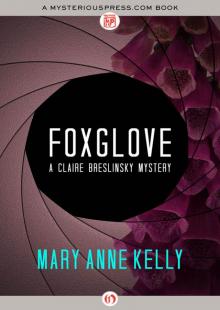 Foxglove
Foxglove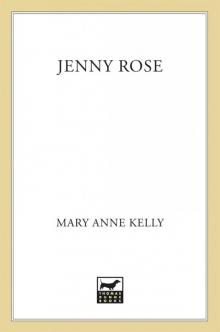 Jenny Rose
Jenny Rose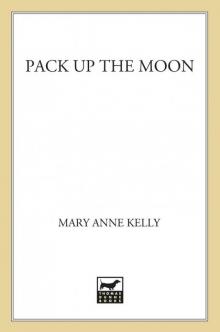 Pack Up the Moon
Pack Up the Moon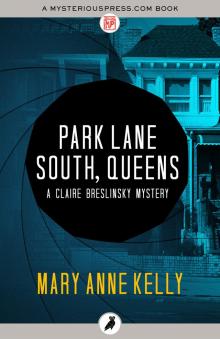 Park Lane South, Queens
Park Lane South, Queens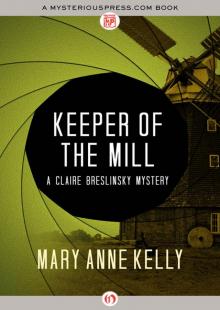 Keeper of the Mill
Keeper of the Mill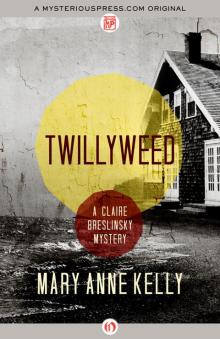 Twillyweed
Twillyweed